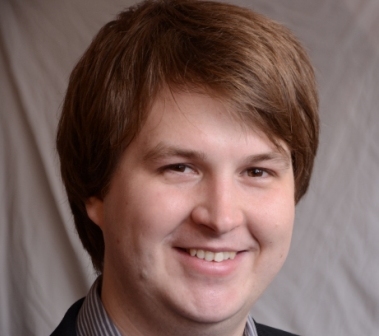David Loxley-Blount in conversation with Paul Filmer

Photo by Guro Skår
How did your interest in music begin?
Amongst other things my mother taught drama and used small percussion instruments, many of which I played with when I was a very young child – they were around the house. They were fragile, and as I grew older there was a risk that I would break them, so I was given a child-sized drum kit as a birthday present. That is one of my earliest memories. I began individual piano lessons when I was 5 or 6 and singing, recorder and musicianship classes at Youth Music Centre on Saturday mornings. I began saxophone lessons when I was 8, after hearing it played at a jazz festival whilst on a family holiday in France and falling in love with the sound of the instrument. I sang in school choirs, and started individual singing lessons when I was 11.
When did you begin composing?
Not seriously until I was about 14, although I was intrigued from early on with musical notation. When I was at primary school I struggled with letter-based ABCD notation until my mother suggested to one of my instrumental teachers that I should work with proper stave notation. The teacher was sceptical, but my mother was right I understood it straight away because it is so much more evidently musical than letter notation: you cant read letters for pitch!
You were unwell for long periods as a child and during adolescence, which kept you out of school. Do you think this has affected your work?
I was ill during both primary and secondary school and in both cases recovery took a long time, so my education, particularly since I was 11, has been highly non-standard, which has enabled me to amass a wide range of mainly creative skills. Until I was 16 my secondary school education and learning was conducted almost entirely one-to-one, at after-school revision classes or in adult education evening classes. This has meant that there are some gaps in my general education: detailed knowledge in science and history, for example, but I dont feel that they are too problematic I dont think that accumulating facts is the be-all-and-end-all. I feel that my experiences have given me a different perspective on the world and life, things have not been easy and my health issues have still not been fully resolved. All this has made me very determined to succeed and has taught me that life is about the journey rather than a short- or long-term destination. Things have been far from simple or straightforward for me, but I have never given up on my hopes and dreams. Ive worked a lot with groups of adults and that has made me think that many young people seem to underrate the value of listening and the things they can learn from their elders. I achieved A grades in both Music and Maths GCSEs a year early. I went back to school-based learning for the first time in 5 years when I was 16 for a course in A2 Level Music and decided during that on further study it was clear that I was going to follow an artistic path, but I didnt yet know whether it would be music or stained glass! It wasnt until I was applying for higher education and went to an open day at Middlesex University that I became sure that I wanted to pursue music. I ended up in a one-to-one tutorial with one of the senior lecturers as I was the only potential student interested in composition on that particular day, and Id taken some of my work with me just in case. Im in the last stages of my second year there as an undergraduate, although because of continuing health difficulties its my fourth year of study as my studies are part-time though it never feels like that as I always have musical activities going on outside university. I begin my final-year work in October.
You’re interested in the visual arts: youve taken classes in painting and drawing, film and photography, and stained glass. How does this relate to your music?
I don’t think that visual imagination can be directly translated into music, although the two do seem to me quite close, in that a visual sense helps the creative side. Musical scores are visual and I do think that the appearance of the notes and their arrangement on the pages of a score can affect performance of a musical work how someone will play or sing it. I think a score must look coherent to those who are going to read it and I try to produce the scores of my compositions with that in mind.
”’That raises how you use structure in your compositions. You write very clearly about the structure of your pieces, the note on Holmfirth, for example and you seem to use the concept of structure also in the way that a critic might, as a way of recovering the meaning of a piece of music. ”’ As far as writing about a composition is concerned that is something that is required by my tutors in the music department at Middlesex University. We have to write a short programme note for every piece that we compose, as well as an account of the background and context of each piece. I do think its important to be able to say, as clearly as I can, what I think the music I compose is about, how I understand the ways in which I have organised and developed it, so I find writing about it a useful discipline. For me, however, there is a limit to a verbal account of a piece of music. Writing about it is like writing about dance, or architecture something is lost in the transition. But I do think structure is important. I have composed pieces with a prior idea of structure, and if a piece is coherent that will be because it has a recognisable structure: composing in a specific form, a string quartet, for example, implies a structure, as does the original folk song that I collected for Holmfirth, although, as I say in the note accompanying that, the traditional musical material is abandoned towards the end. My organ composition, Sonus Repercussus, was intended to be episodic from the outset. Sometimes, too, a sense of formal structure can help you get out of a compositional corner when youre struggling with a musical idea. At times I have written with a through-composed approach to structure following through the initial idea in terms of what seems to be its own musical logic. One of my tutors calls this taking a line for a walk and that seems to me a good description. Currently I would say that I approach writing with a hybrid of structural approaches, this seems a comfortable and successful way of composing for me at the moment.
What about your own experience of performing how does that affect your composing?
Well, I play piano, of course, but my first instrument is actually saxophone I played in a wind orchestra for four years and a saxophone ensemble for more than 6 years. I have access to a two-manual organ at a church in Finchley, where I can practise and try out parts of my compositions. Over the last 18 months I’ve been to a lot of organ recitals at Bloomsbury Central Baptist Church, where there is three screen projection to see the organist in action, which often gives me ideas on what and how I might write, and what is physically possible on the organ. Philip Luke, the organist there, has been very helpful in developing my recent work. As well as singing with NLC I sing in two church choirs. With one of these choirs I recently spent 3 days as the resident choir at York Minster. As well as giving me another kind of experience of performing, which helps with composing choral works, it enables me to hear other organs and how they are played.
”’How important do you think the context of a composition is to understanding and appreciating it? ”’ No piece of music stands on its own, all music is part of something bigger, the context in which it is composed, performed and heard. As far as those who listen to it are concerned, they will bring to it their own expectations and experience and that is to some extent also the case for the performers. As a composer I draw on a lot of influences and experiences which context my work. My work for string quartet, The Morning River Glideth, uses those words from the closing lines of Wordsworths sonnet Westminster Bridge as its title because the central section was originally a setting of the poem for voice and piano which has never been performed,it is regarded as too complex, though I still have hopes that it will be. The score was combined with another sketch to become one piece, with a linking section in between them and a codetta section to round off the work. Sonus Repercussus is an expansive and sonorous work intended specifically to make use of the impressive dynamic range and sound colours of the organ in St Albans Cathedral, which was refurbished in 2007. I made two visits to hear Saturday evening recitals there whilst writing the piece, and its sections of varying character and duration, which alternate between a recurring homophonic passage show both my experience of organ playing and the influence of a considerable range of composers for organ, from Bach to Messiaen, as well as contemporary composers such as Francis Pott, who has encouraged me and given me some useful advice in relation to my composing over the last few years.
What about your interests outside music?
Photography is a strong interest of mine and I enjoy sailing, windsurfing and kayaking, as well as riding and dressage and have been quite successful at all of these. I havent managed to do much of the sport based activities since 2003, I still sail very occasionally when circumstances and my energy allows, time on the water is very good thinking time!
And your plans for future work?
In the short term, I have plans for instrumental works over the next year and a half for solo organ, symphonic wind orchestra, brass quintet, saxophone quartet, flute ensemble and another work for string quartet. I am also planning some new choral works: a new carol and an anthem, though I havent decided on texts for these, another setting for evening service or Eucharist and a set of Preces and Responses. These are all sacred pieces but I would also like to compose a new secular choral work again, though, I have yet to decide on a text. In the longer term I hope to compose a concerto for organ, orchestra and chorus.
